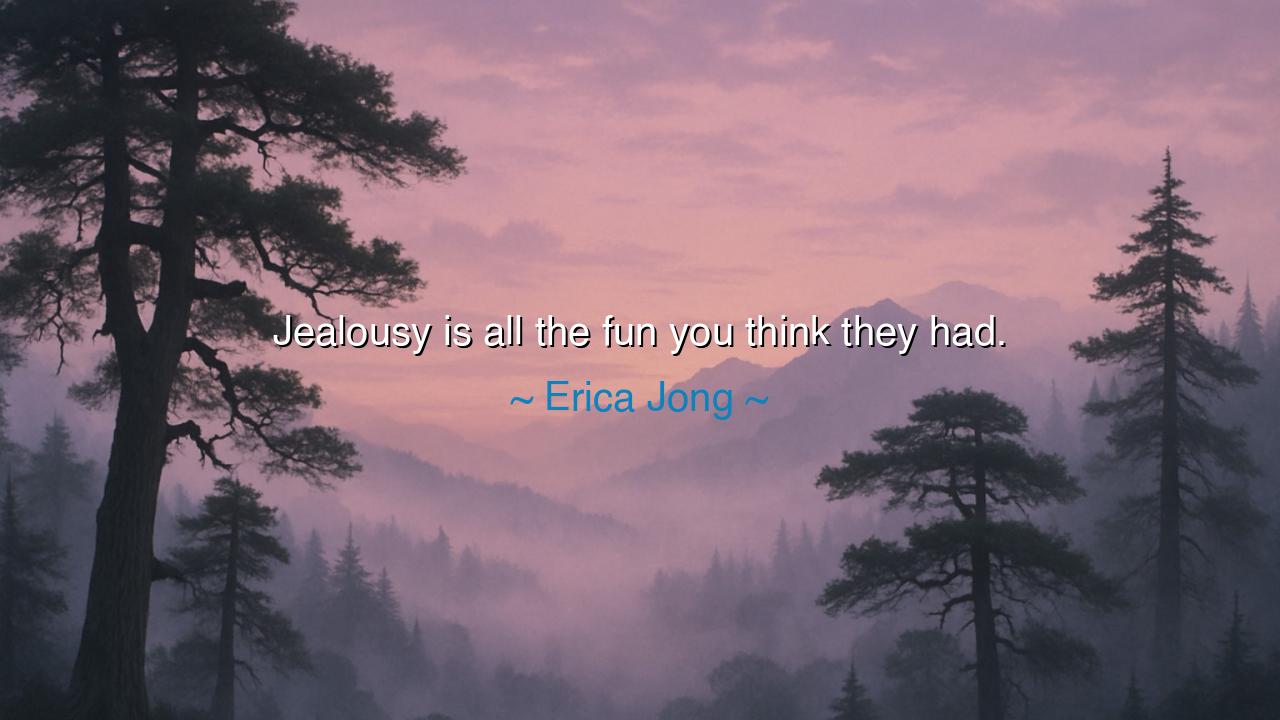
Jealousy is all the fun you think they had.






“Jealousy is all the fun you think they had.” – Erica Jong
Hear, O seeker of peace, and ponder these sharp yet playful words from Erica Jong, the poet and author whose pen revealed the secret chambers of the human heart. In this saying, she unmasks the illusion that dwells within jealousy—that venomous feeling born not of truth, but of imagination. Jealousy, she teaches, is not the pain of what is, but the suffering we invent in our minds. It is not the other’s joy that wounds us, but the image of their joy that we ourselves have conjured. Thus, Jong speaks with both wit and wisdom, reminding us that most of our torment is self-made, a mirage born of envy and fear.
The ancients too knew this truth. They saw jealousy as a fire that burns without need of fuel, feeding only upon illusion. The jealous man gazes upon another’s happiness and imagines it brighter than it is, richer than his own. He does not see the toil beneath the laughter, the doubts behind the smiles. He crafts in his mind a false paradise where others live in endless pleasure while he remains in shadow. Jealousy, therefore, is fantasy twisted into pain; it is “all the fun you think they had”—a cruel trick played by the mind upon itself.
Consider the tale of Salieri, the composer who envied Mozart. History remembers him not for his own works, but for the bitterness that consumed him. Salieri saw in Mozart’s genius a tormenting light, and in that light he imagined unbroken joy, divine favor, and effortless triumph. But Mozart’s life was far from charmed—plagued by poverty, illness, and despair. Yet Salieri’s jealousy would not see this truth; it feasted instead upon the fantasy of another’s perfection. Thus he poisoned his own soul, destroyed his peace, and earned the pity of history. His suffering was not from Mozart’s success, but from the illusion of the joy he imagined Mozart possessed.
So too in our own hearts does jealousy take root. We look upon others through the distorted glass of assumption. We see their celebrations but not their tears, their victories but not their wounds. We imagine their lives as free of struggle, their hearts untouched by pain. But the wise know that no soul escapes trial, that every smile hides its own shadows. When we envy, we worship a fiction. We suffer not because of reality, but because of the story we tell ourselves about it.
In this way, Erica Jong’s words are not merely a jest—they are an awakening. They teach us to look upon our envy and laugh, for what we envy is not real. The “fun” we think others had is but a dream, no truer than mist at dawn. The heart that recognizes this truth is freed; it no longer wastes its strength on comparison, but turns inward to cultivate its own joy. The wise do not measure happiness by the smiles of others; they create their own flame and guard it well.
Therefore, when the shadow of jealousy stirs within you, pause and look deeper. Ask yourself: What am I truly envying? Is it their success—or my belief that their success was effortless? Is it their joy—or my fear that I have none? In truth, jealousy reveals not what others have, but what we have forgotten to cherish in ourselves. The cure is not to chase another’s dream, but to nourish our own—to build a life so rich with meaning that no illusion can tempt us from it.
Let this be your lesson: Jealousy is illusion, gratitude is truth. The envious heart imagines paradise in others; the grateful heart finds paradise where it stands. When envy rises, meet it with laughter. When bitterness whispers, silence it with appreciation. See clearly, and you will realize—as Jong did—that those you envy are as human as you. Their laughter and their tears flow from the same source as yours.
So, live not in the shadow of imagined pleasures, but in the radiance of your own becoming. Jealousy is but a trick of the mind; joy is its awakening. Free yourself from comparison, and you will find, as all the wise have found, that the truest happiness lies not in what others have, but in the peace of knowing who you are.






AAdministratorAdministrator
Welcome, honored guests. Please leave a comment, we will respond soon